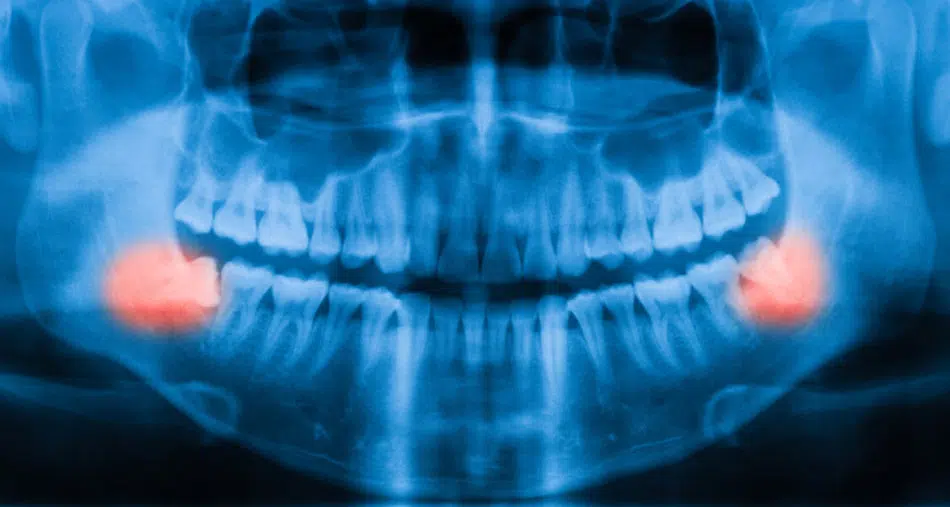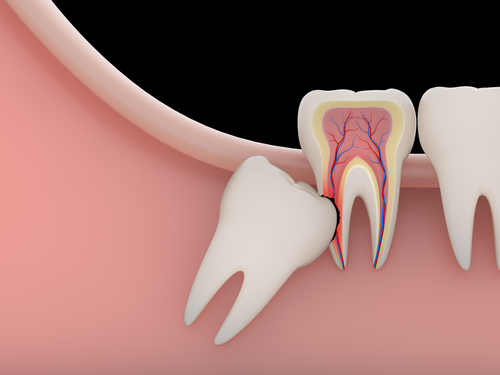Wisdom Teeth Removal in Forney, TX
As we mature, our mouths undergo several dental changes. By approximately 18 years of age, most adults have 32 teeth in total – 16 on the top and 16 on the bottom. The front teeth, which include incisors, canines, and bicuspids, play a vital role in biting and segmenting food. Meanwhile, the molars, located at the mouth’s rear, are designed for grinding food to a consistency fit for swallowing.
However, a slight design flaw in nature means our mouths are typically equipped to comfortably hold only 28 teeth. So, what happens to the extra four? These are what we commonly refer to as wisdom teeth or third molars, and they can sometimes be more problematic than wise.
To learn more about our high-quality, affordable wisdom teeth removal in Forney, TX, please schedule an appointment with us and speak to Dr. Gibbins or Dr. Draper about any questions you may have. We will happily assist you!

What Are Wisdom Teeth?
Wisdom teeth are the final set of molars that appear in adulthood. Positioned at the very back of the mouth, they often face spatial challenges. While some lucky individuals might never deal with wisdom tooth issues, for others, these molars can become a genuine dental predicament. From causing mere discomfort to being completely entrapped in the jawbone and gums, wisdom teeth can present various complications.
When is Wisdom Teeth Removal Necessary?
It’s a common misconception that every wisdom tooth needs to be extracted. If they grow correctly aligned and are surrounded by healthy gum tissue, they can often remain without causing any problems. However, many aren’t so fortunate.
Several challenges associated with wisdom teeth include:
- Partial Emergence: When wisdom teeth can’t fully emerge, they create an avenue for bacteria to enter the surrounding tissues, leading to infections characterized by swelling, stiffness, pain, and general malaise.
- Misalignment: The undue pressure from misaligned wisdom teeth can affect neighboring teeth, disrupting natural or achieved dental alignments.
- Serious Complications: In rare cases, tumors or cysts can develop around impacted wisdom teeth, jeopardizing the jawbone and nearby teeth.
Therefore, early consultation and potential removal can stave off these complications, ensuring a healthier oral landscape.
When To See An Oral Surgeon
It’s generally advisable for individuals, especially those in their mid-teens, to seek an early evaluation. By conducting a detailed examination and utilizing X-rays, Dr. Draper and Dr. Gibbins can offer insights into the position and potential concerns surrounding your wisdom teeth.
All outpatient surgery is performed under appropriate anesthesia to maximize patient comfort. Dr. Draper and Dr. Gibbins have the training, license, and experience to provide these types of anesthesia for patients.
Wisdom Teeth Removal Procedure
Preparation and Anesthesia: Before the procedure begins, our patients are made comfortable in the treatment chair. Depending on the complexity of the extraction and the patient’s preference, a suitable anesthesia will be administered. This can be local anesthesia to numb the area, sedation anesthesia to suppress consciousness during the procedure, or general anesthesia to ensure patients remain entirely unconscious. Both Dr. Draper and Dr. Gibbins have the necessary training to safely administer anesthesia, ensuring patient comfort and safety throughout.
Incision and Access: Once the anesthesia has taken effect, an incision is made in the gum tissue to expose the tooth and bone. This provides the surgeons with clear access to the impacted or problematic wisdom tooth.
Bone Removal: In some cases, bone blocking access to the root of the wisdom tooth needs to be removed. This is done with precision and care to ensure the surrounding teeth and tissues are unaffected.
Tooth Division: If the wisdom tooth is large or positioned in a manner that makes a direct extraction challenging, it might be divided into smaller sections. This fragmentation facilitates its removal through the created opening without causing excessive strain on the surrounding tissues.
Extraction: Once adequate access is achieved, the tooth or its segments are carefully extracted. Specialized dental instruments are employed to ensure the tooth is removed with minimal disturbance to the surrounding areas.
Cleaning and Stitching: After the tooth is removed, the site is thoroughly cleaned to remove any debris or tooth fragments. If necessary, the wound is then sutured to aid healing and minimize bleeding. The stitches used are often dissolvable and will naturally degrade over time.
Recovery: Post extraction, gauze is placed over the treatment site to manage any bleeding and assist in clot formation. Patients are then allowed to rest and recover from the anesthesia under the watchful eyes of our trained medical staff. Detailed post-operative care instructions, including pain management and oral hygiene, are provided to ensure swift and smooth healing.
Upon discharge, your postoperative kit will include postoperative instructions, a prescription for pain medication, and antibiotics, and one of our staff members will discuss your post-op care instructions with your driver.
Our facility is geared towards patient safety, boasting advanced monitoring equipment. Additionally, both Dr. Draper and Dr. Gibbins have extensive experience in various anesthesia techniques, ensuring optimal patient comfort.
If you have any questions, please do not hesitate to call us.
Risks of Neglecting Wisdom Teeth Issues
Choosing to overlook discomfort or pain from wisdom teeth can invite more significant complications:
- Infections: Untreated wisdom teeth can lead to severe infections in the gums and jaw.
- Impaction: They might become completely lodged, causing pain and potentially impacting neighboring teeth.
- Pain Escalation: What starts as mild discomfort can intensify, leading to chronic pain.
- Cyst Development: In untreated cases, cysts might form, necessitating more complex treatments.

Types of Wisdom Tooth Impactions
Wisdom tooth impactions refer to the manner in which the molars are positioned in the jaw and their ability (or inability) to emerge through the gums properly. Different types of impactions include:
- Vertical Impaction: This is when the wisdom tooth tries to emerge straight up but is blocked by the molar in front of it.
- Horizontal Impaction: Here, the wisdom tooth is angled horizontally and grows directly into the roots of the adjacent molar, which can cause significant problems.
- Mesial Impaction: The most common type of impaction, mesial impaction occurs when the wisdom tooth angles towards the front of the mouth and generally results in partial emergence.
- Distal Impaction: This happens when the wisdom tooth angles towards the back of the mouth.
- Soft Tissue Impaction: The crown of the wisdom tooth has penetrated through the bone, but the gum is covering part or all of its crown.
Can You Get Wisdom Teeth Removed as an Adult?
Yes, adults can have their wisdom teeth removed. However, as patients age, the bones in the mouth get harder, making the teeth more firmly anchored. As a result, adult extractions can be more complicated than those for younger patients.
Potential Complications for Adult Extractions:
- Delayed Healing: Older adults might experience a slower healing process compared to younger individuals due to decreased cell regeneration.
- Increased Risk of Nerve Damage: The longer a wisdom tooth has been in the mouth, the closer it might be to nerves. This proximity increases the potential for nerve damage during extraction.
- Jawbone Issues: In some older adults, the jawbone might become denser and harder over time, making the extraction more challenging and possibly leading to temporary or permanent jaw stiffness post-operation.
- Sinus Issues for Upper Wisdom Teeth: Particularly in older patients, the roots of the upper wisdom teeth might be closer to the sinus, and removal might lead to sinus issues.
Despite these challenges, Dr. Draper and Dr. Gibbins are experienced in handling complicated extractions and will take every precaution to minimize risks. Always discuss your concerns with them before the procedure.
Is Wisdom Tooth Removal Covered by Insurance?
Wisdom tooth removal can be classified as a necessary medical procedure, especially if they are causing pain, infection, or other dental issues. Most dental insurance plans cover part or all of the cost for the removal of impacted wisdom teeth. However, if the extraction is not deemed medically necessary but is more of a preventive measure, the coverage might differ.
Always consult with your insurance provider about the specifics of your coverage. Our administrative team can also assist in providing procedure codes if you wish to inquire with your insurance beforehand.
Improve Your Dental Well-Being in Forney, TX
If you want to learn more about our high-quality, affordable wisdom teeth removal, give us a call or schedule a consultation today! Our friendly staff will happily assist you. We look forward to meeting you and starting your smile journey together!